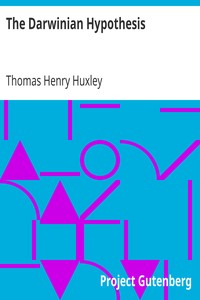The Darwinian Hypothesis by Thomas Henry Huxley
"The Darwinian Hypothesis" by Thomas Henry Huxley is a scientific publication written in the mid-19th century. This work serves as an examination of Charles Darwin's theory of natural selection, proposing that species evolve through a process where the fittest survive in the struggle for existence. Huxley, a prominent biologist and advocate of Darwin's ideas, aims to clarify and defend the implications of Darwin's work while addressing the controversies surrounding it. In this
publication, Huxley discusses the concept of species, the complexities of categorization in nature, and how different organisms adapt to their environments. He delves into the interplay of heredity and variation, illustrating how natural selection operates within the dynamic and competitive aspects of living organisms. By using examples from the animal and plant kingdoms, Huxley elucidates the process of artificial and natural selection, inviting readers to consider the broader implications of evolution. He balances rigorous scientific argumentation with philosophical inquiry, ultimately advocating for a scientific approach to understanding the origins of species and challenging established beliefs of his time. (This is an automatically generated summary.)
Read or download for free
| How to read | Url | Size | |||
|---|---|---|---|---|---|
| Read now! | https://www.gutenberg.org/ebooks/2927.html.images | 57 kB | |||
| EPUB3 (E-readers incl. Send-to-Kindle) | https://www.gutenberg.org/ebooks/2927.epub3.images | 96 kB | |||
| EPUB (older E-readers) | https://www.gutenberg.org/ebooks/2927.epub.images | 95 kB | |||
| EPUB (no images, older E-readers) | https://www.gutenberg.org/ebooks/2927.epub.noimages | 87 kB | |||
| Kindle | https://www.gutenberg.org/ebooks/2927.kf8.images | 197 kB | |||
| older Kindles | https://www.gutenberg.org/ebooks/2927.kindle.images | 190 kB | |||
| Plain Text UTF-8 | https://www.gutenberg.org/ebooks/2927.txt.utf-8 | 50 kB | |||
| Download HTML (zip) | https://www.gutenberg.org/cache/epub/2927/pg2927-h.zip | 96 kB | |||
| There may be more files related to this item. | |||||
Similar Books
About this eBook
| Author | Huxley, Thomas Henry, 1825-1895 |
|---|---|
| Title | The Darwinian Hypothesis |
| Credits |
This eBook was converted to HTML, with additional editing, by Jose Menendez from the text edition produced by Amy E. Zelmer. |
| Reading Level | Reading ease score: 43.9 (College-level). Difficult to read. |
| Language | English |
| LoC Class | QH: Science: Natural history |
| Subject | Evolution (Biology) |
| Subject | Darwin, Charles, 1809-1882 |
| Category | Text |
| EBook-No. | 2927 |
| Release Date | Nov 1, 2001 |
| Most Recently Updated | Oct 30, 2020 |
| Copyright Status | Public domain in the USA. |
| Downloads | 223 downloads in the last 30 days. |
| Project Gutenberg eBooks are always free! | |

